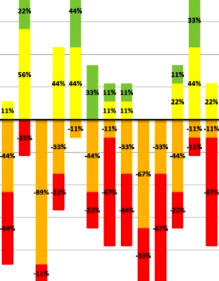|
Getting your Trinity Audio player ready...
|
 This week we have a hero amongst a whole lot of zeroes. Earlier this year we reported on the South African public’s perception of government corruption – in our article we revealed that, according to Transparency International’s global corruption barometer, 74% of respondents in South Africa believe that public officials and civil servants are corrupt. This perception may not be altogether inaccurate, if the results of the government’s Management Performance Assessment Tool (MPAT) are anything to go by.
This week we have a hero amongst a whole lot of zeroes. Earlier this year we reported on the South African public’s perception of government corruption – in our article we revealed that, according to Transparency International’s global corruption barometer, 74% of respondents in South Africa believe that public officials and civil servants are corrupt. This perception may not be altogether inaccurate, if the results of the government’s Management Performance Assessment Tool (MPAT) are anything to go by.
On 11 September, Minister in the Presidency Collins Chabane revealed the results of the MPAT, which evaluated senior managers in all 156 national and provincial government departments for the 2012/13 financial year. The assessment has the overall aim of improving service delivery, and assesses departments on 29 generic management standards.
For more detail on the standards and results, download the findings of the MPAT.
Allowing fraud and corruption to flourish
Chabane broke the news that, among other disturbing statistics, 64% of departments do not comply with policies to detect and prevent fraud and corruption – an alarming 100 out of the 156 surveyed. In this area, only 19% of departments were fully compliant, and a mere 17% were fully compliant and “performing smartly” – that is, they took their compliance to higher levels.
Furthermore, 76% of departments don’t ensure they have policies and systems in place for promoting professional ethics. This would include, for instance, the submission of financial disclosures to the Public Service Commission. And 61% don’t have processes in place for detecting and preventing unauthorised expenditure and addressing internal audit findings.
The hero in the sorry tale is the Department of Science and Technology, which came out tops of all national departments, failing to reach the required standard in just three of the 29 standards, including that of improvement mechanisms for service delivery. .
The worst performers were the departments of Public Works and Women, Children and Persons with Disabilities. They, and five other departments, did not meet any of the required standards.
Adhering to management standards
Chabane explained that the 29 areas of assessment included factors such as:
- procurement and expenditure management.
- accountability
- ethics
- internal audit and risk management
- monitoring and evaluation
- service delivery improvement
- functionality of management structures
- human resource planning
- management of discipline
Chabane said that compared to last year’s results, there had been some improvement in strategic and financial management. But governance and accountability showed a decline in scores.
National and provincial departments were assessed according to four levels of management performance — a green block represented full management compliance with smart performance, a yellow block indicated full compliance, an orange block represented partial compliance, and a red block indicated non-compliance with the minimum standards.
In the broader category of governance and accountability, which encompassed fraud prevention, professional ethics and risk management, among others, only 39% of departments received a green or yellow score, while 61% were sub-standard.
The fact that “so many departments did not meet the standards for ensuring professional ethics” is cause for concern, given the government’s commitment to fighting corruption in the public service, stated the report.
In terms of fraud prevention specifically, said Chabane, this is important in ensuring high levels of service delivery and responsible use of public resources, as well as securing public confidence in government departments. The 19% of departments that were fully compliant did have “approved fraud prevention plans and whistleblowing policies”. The 17% that were fully compliant and operating smartly “showed evidence of taking disciplinary action and/or instituted criminal or civil proceedings where fraud and corruption occurred”.
While this is comforting, the fact that 27% of government departments don’t have a fraud prevention plan – even in draft form – is worrying. “These departments operate without a conscious effort to prevent fraud and corruption, and without strategies to root out corruption if it exists,” stated the report.
The balance of 37% did have a draft fraud prevention plan that was awaiting approval, or had an approved fraud prevention plan but no whistleblowing policy.
“The high level of non-compliance by departments in the areas of internal audit and risk management also weakens the fight against fraud, corruption and wastage of public funds,” concluded this section of the report.




